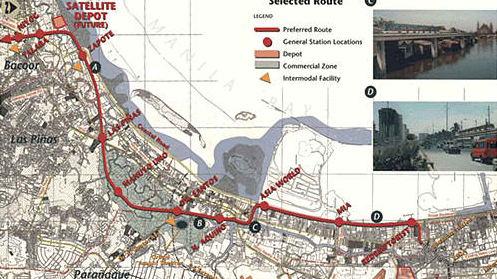SUMMARY
This is AI generated summarization, which may have errors. For context, always refer to the full article.

MANILA, Philippines – Four of the country’s biggest business groups are among the final bidders for the P60-billion Light Rail Transit line 1 Cavite extension project, the biggest infrastructure project under the Aquino administration’s public-private partnership (PPP) scheme.
On Monday, October 22, the following submitted the required documents that marked their formal entry into the race for the rail project that will connect Metro Manila and the highly populated Cavite province:
- Light Rail Manila Consortium is the tandem between Metro Pacific Investments Corp. (MPIC) and Ayala groups. MPIC holds 33% stake and isis the lead member of the consortium that includes Ayala Corp. (33%) and its unit AC Infra Holdings Corp. (12%), Macquarie Infra Holdings (Phils) Pte Ltd. (10%), and RATP Devt. S.A., one participation unit. Handling the railway infrastructure for the group are Bouygues travaux Publics SA, Obrascon Huarte Lain SA, and Leighton Contractors Asia Ltd. Taking care of the railway system will be Alstom Transport SA and Ansaldo STS PA. The operation and maintenance will be handled by RATP Development SA.
- SMC Infra Resources Inc. is composed of GS Engineering and Construction Corp, and POSCO Engineering and Construction Co Ltd. The POSCO Engineering will take care of the railway set and Korea Railroad Corp. the railway system
- DMCI Holdings, Inc. of the Consunji group. DMCI’s partners are Marubeni Corp. and Sistema Tranporte Collectivo Metrorey.
- MTDC-Samsung Consortium, the only entity led by a foreign group. MTD Capital Bhd of Malaysia holds 33% stake in the consortium; South Korea-based Samsung Samsung C&T Corp, 20%; Union Equities Inc, 15%; DM Wenceslao & Associates, 12%; and Primewater Infra Corp, 20%. The railway infrastructure will be handled by MTD Capital and Samsung C&T, while the system will be provided by Hyundai Rotern Co. The operation and management will be handled by Seoul Metro.
This trims down the previous 33 firms that expressed interest and bought the bid documents from Department of Transportation and Communications (DOTC) in July.
Two other bidders were disqualified: Luzon Rail Transit System, which submitted at 2:20 pm, beyond the 2 pm deadline; and Ecorail, which submitted 8 out of 10 requirements on time but the remaining two envelopes were submitted after 2 pm.
“There are very clear provisions in the invitation to prequalify. It’s an all or nothing proposition. We decided not to accept the two bids of Ecorail and Luzon Rail for failure to submit their requirements on time,” said DOTC undersecretary Jose Perpetuo Lotilla during the opening of the pre-qualification documents.
The Special Bids and Awards Committee (SBAC) of the DOTC, the project proponent, opened the pre-qualification documents the Final 4 submitted, to check whether these complied with the requirements. The SBAC will then evaluate the bids over the next two weeks, said Lotilla.
The rail project
This railway project will extend the existing 20.7-kilometer (km) LRT Line 1 system, which runs from Roosevelt Ave in Quezon City to Baclaran in Paranaque, by an additional 11.7 km southwards to Bacoor, Cavite.
Once completed, the new line will increase ridership of LRT1 from 500,000 to 700,000 passengers per day thus provide faster and more convenient alternative to residents of Cavite, Las Pinas and Paranaque.
The project cost will be equally split between the private sector and the government, which will spend for the purchase of up to 39 new car train sets, construction of the satellite depot, among others.
The government’s obligation include the turn-over of its possession of the existing Line 1 assets for rail operation and maintenance, acquisition and delivery of right of way, implement the automated fare collection system (AFCS) project, and ensure the application of periodic fare adjustments.
Meanwhile, the winning bidder is obligated to finance, design and construct the Cavite extension; undertakes immediately the operation and maintenance of existing system and the integrated system upon completion of the extension project; undertakes future system maintenance and upgrades; assumes ridership risk; receives fare box; and undertakes an approved commercial development.
The government will hold another auction for the centralized AFCS. “For the LRT fares, we will move from zone-based fare to boarding plus a distance fare scheme. There will also be periodic fare adjustments over the concession period. But the government will hold a separate bidding for the AFCS. This project shall be tendered parallel to line 1,” said former DOTC secretary Mar Roxas.
The DOTC has taped the IFC (International Finance Corporation) as its transaction advisor which in turn has tapped URS and Pinsent Masons as its technical and legal specialists. – Rappler.com
Add a comment
How does this make you feel?
There are no comments yet. Add your comment to start the conversation.